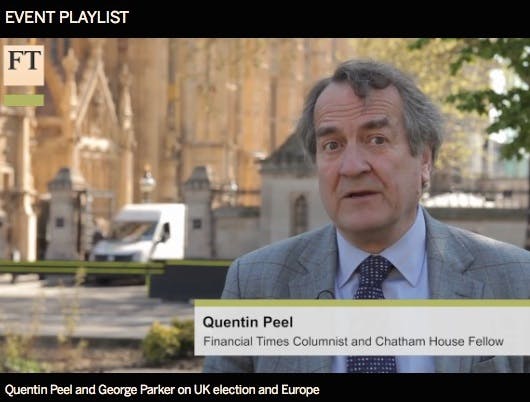
Today the Financial Times kicks off a year-long series to debate the future of Europe in Berlin, Brussels and London. The debates, hosted in partnership with King’s College London and the Centre for European Reform (CER), will bring together senior officials from business, government, academia and think tanks to explore the evolving EU / UK relationship following this year’s UK election.
The initial debates are by invitation only, and will culminate in a major summit in Spring 2016. Guests will contribute to the discussion of the critical policies and trends that are changing the tides on the continent, and and how and why the EU might need to reform itself.
Roula Khalaf, FT’s foreign editor, said: “The Financial Times has a long-established presence in Europe with a 465-strong editorial team, and it remains one of our most important markets. We reach more business decision-makers in Europe than any other international news organisation, and have seen a 71% increase in European digital subscribers in the last five years. This series of debates is a significant initiative about a pivotal issue that draws on our deep editorial experience and expertise in the region.”
The inaugural event on 29 April will be hosted at the FT by comment and analysis editor Frederick Studemann. Speakers are:
- Andy Bagnall, Director of Campaigns and Governance, Confederation of British Industry
- Professor Geoffrey Evans, Co-Director of the 2015 British Election Study. Official Fellow in Politics at Nuffield College, University of Oxford
- Charles Grant, Director, Centre for European Reform (CER)
- George Parker, Political Editor, Financial Times
The initiative follows a string of editorial hires to strengthen the FT’s award-winning European coverage, including the appointment of Alex Barker as European diplomatic editor, based in Brussels.
In March the Financial Times won the Business Team of the Year category at the Press Awards for its series: Silk Road Redux: China in Europe, exploring Chinese investors’ spending spree in the eurozone in the wake of the currency bloc’s crisis.
In December, Peter Spiegel was recognised as one of the top ten most followed journalists by world leaders. His “How the Euro Was Saved” series is considered the definitive account of the events of 2011 and 2012 that forever changed Europe. It was shortlisted for a British Journalism Award and a finalist in the SABEW Best in Business journalism awards, and it was one of the best read series on FT.com of 2014.
FT editor Lionel Barber was named one of the 101 most influential Europeans by Le Nouvel Observateur (1998), one of the 50 most influential personalities in Europe by European Voice (2001) and one of the 40 most influential Britons on current EU policy-making in 2012. In 2001, Barber was invited to brief George W. Bush on European affairs ahead of the president’s inaugural mission to Europe and he frequently speaks on foreign and fiscal policies in the region.
- ends -
About the Financial Times:
The Financial Times, one of the world’s leading business news organisations, is recognised internationally for its authority, integrity and accuracy. Providing essential news, comment, data and analysis for the global business community, the FT has a combined paid print and digital circulation of 720,000. Mobile is an increasingly important channel for the FT, driving almost half of total traffic. FT education products now serve two thirds of the world’s top 50 business schools.
For more information, please contact:
Kristina Eriksson
kristina.eriksson@ft.com
+44 (0) 20 7873 4961